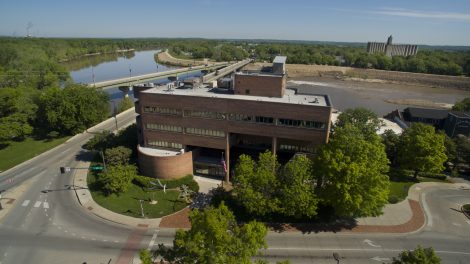Lawrence City Commission to consider committing to 100% renewable energy

photo by: Nick Krug
Lawrence City Hall, 6 E. Sixth St., is pictured on May 3, 2016.
City leaders will soon decide whether to commit to running on all renewable energy in the coming years.
As part of its meeting Tuesday, the Lawrence City Commission will consider adopting an ordinance that establishes municipal and community-wide goals to achieve 100% renewable energy. In December, the commission voted unanimously to direct city staff to draft an ordinance to achieve use of 100% renewable energy and subsequently develop a plan of action to achieve the goal.
The draft ordinance states in part that the climate crisis is accelerating faster than most scientists expected and requires action by all communities to reduce greenhouse gas emissions to protect the planet and community for future generations. The ordinances goes on to state that to make progress toward the city’s commitment to reducing emissions, the city needs to transition all energy sectors to carbon-free sources and make buildings more energy efficient.
The ordinance provides incremental goals toward 100% renewable energy, but the ultimate goal is for the all municipal operations and power usage citywide to come from renewable sources by 2050. At the meeting in December, several commissioners expressed enthusiasm for codifying the city’s renewable energy goals, but also said that a specific plan to achieve them would be key.
In a memo to the commission, city staff state that strategies and actions steps to achieve the goals will be integrated into the development of the city’s Climate Action and Adaptation Plan. The city allocated $75,000 as part of its 2020 budget to update its existing climate protection plan, and that effort will soon get underway.
Lawrence-Douglas County Sustainability Director Jasmin Moore said in an email to the Journal-World that there are many paths to the ultimate goal of 100% renewable energy for the community. Moore said that options look very different today than they did 5 or 10 years ago, and that she anticipates new developments in the near future to broaden the options even further.
Some cities have opted to buy solar arrays or wind turbines, but Moore said the city is not a regulated electricity provider, so at this time is not able to generate or provide electricity to customers. She said the city would need to partner with the city’s electric provider, Evergy, to work toward the 100% renewable goal. She noted Evergy’s announcement last month that it planned to reduce carbon emissions 80% and add 660 megawatts of wind energy to its portfolio.
The ordinance breaks the city’s efforts toward 100% renewable energy into incremental stops. Initially, the ordinance calls for the city to use 100% renewable energy for the electricity needs of its municipal operations by 2025 and for electricity communitywide by 2035. By 2040, the board recommends the city use 100% renewable energy for all sectors of its municipal operations, including electricity, heating and cooling and transportation. By 2050, the board calls for the city to achieve the ultimate goal of using all renewable energy communitywide.
The cost of adopting the goals is unknown at this time, according to the memo. The memo states there are multiple variables that may influence future fiscal impacts, including the falling cost of renewables like wind and solar. The memo states technologies are evolving so quickly it is difficult to project what the cost will be in a few years.
The City Commission will convene at 5:45 p.m. Tuesday at City Hall, 6 E. Sixth St.







